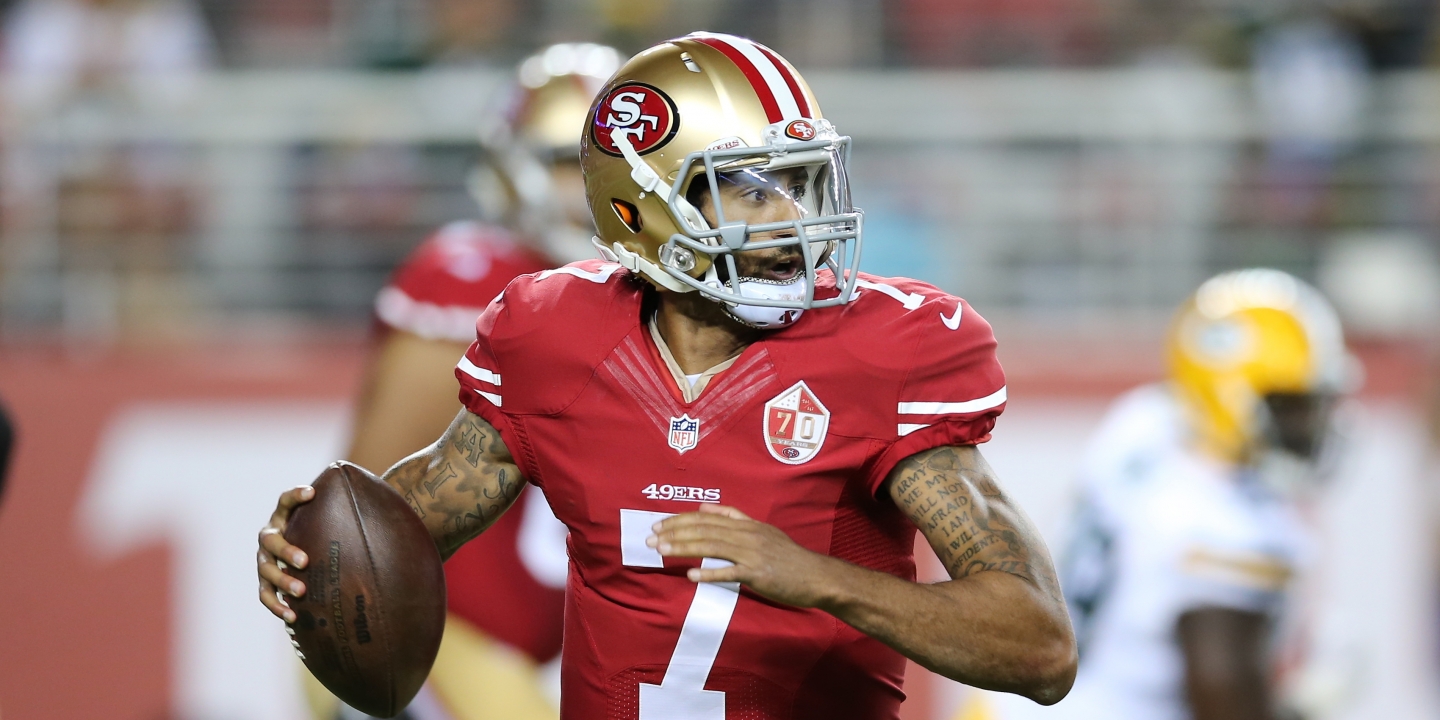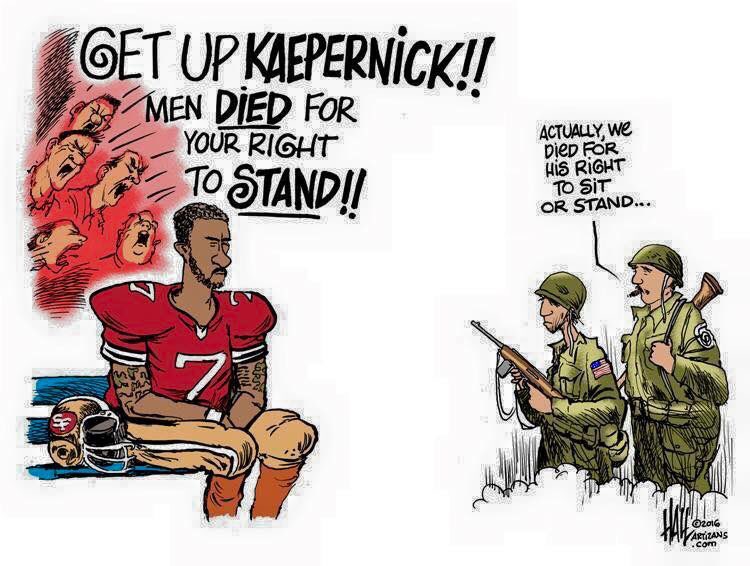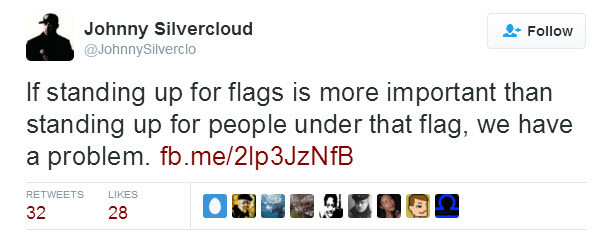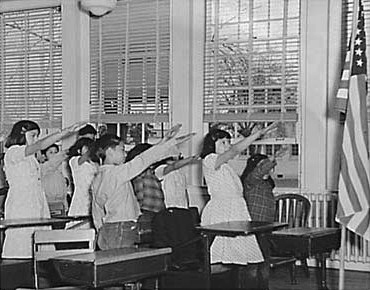What Kaepernick’s Protest Says About Phony Patriotism
Sep 18 2016It's encouraging that Colin Kaepernick's refusing to stand during the playing of the national anthem at a pre-season game has found many who salute his action, in opposition to the automatic outrage of those who believe singing the 
anthem, pledging allegiance, stickering their vehicles with yellow ribbons and flying the flag on holidays are what constitute patriotism.
His protest, objecting against a country "that oppresses black people and people of color", was an outsized act of courage by the San Francisco 49ers quarterback for having done so before a stadium of spectators, probably leading to season-long hostility from "fans", and possibly a hefty fine and/or suspension by the NFL for this act of heresy. But supporters spoke out, notably Kareem Abdul-Jabbar in a Washington Post essay.
His demurral was for a specific reason, but it brings up wider issues, such as why we are so accepting of coerced speech in this land that so celebrates free speech. It is coerced speech for those attending that game and every game when we are expected to stand and sing the anthem (or pretend to) or endure the disapproving frowns and glares of those around us — or of a whole stadium of people in the case of Kaepernick if he intends to sit out a season full of anthems.
And for that matter, why the linkage between the anthem and sports events? Are sports our most patriotic moment? The anthem, along with those of other countries, is fitting when winners mount the podium at the Olympics to receive their medals, and before matches at the Euro and World Cup, because there the athletes and teams represent their nations, but why at football and baseball games where it is only cities or colleges competing against each other? This peculiar practice is worthy of a conspiracy theory: is there a secret government beyond the one we know that values the herding together of thousands into stadiums as the perfect opportunity to keep the people in line, calling all to rise from their seats and place their hand s over their hearts to re-affirm their fealty to the nation or else be shamed by those around them? Would you believe that how we are supposed to behave when the anthem is played is in the U.S. Code?
Doubtless many in those crowds think that precede our public rituals with the "Stars Spangled Banner" must be prescribed by the Constitution. In fact, it only became the nation's anthem in 1931. It began as a poem by lawyer Francis Scott Key written two years after watching the bombardment of Fort McHenry in Baltimore Harbor in 1812 when we were at war again with the British. It was later set to a song, originally written for a British social club, that had become popular in the United States. What is startling, as brought to light by this piece by Jon Schwarz at The Intercept, is that, seemingly unwittingly, Kaepernick chose the anthem as the perfect agency for his protest about oppression of blacks. The article is titled "Colin Kaepernick Is Righter Than You Know: The National Anthem Is a Celebration of Slavery".
The British had been recruiting escaped American slaves into their ranks. With their numbers added to 20,000 British troops "Mr. Madison will be hurled from his throne", read the orders from the Royal Navy’s Admiral Sir George Cockburn, which commanded...
"Let the landings you make be more for the protection of the desertion of the Black Population than with a view to any other advantage."
Schwarz informs us that Key's poem is four verses long. We only sing the first. The third verse ends with:
No refuge could save the hireling and slave
From the terror of flight or the gloom of the grave,
And the star-spangled banner in triumph doth wave
O’er the land of the free and the home of the brave.
Schwarz then writes,
"So when Key penned 'No refuge could save the hireling and slave / From the terror of flight or the gloom of the grave,' he was taking great satisfaction in the death of slaves who’d freed themselves. His perspective may have been affected by the fact he owned several slaves himself."

Kaepernick later told the AP that he did know of the verse before the game. Apart from athletes who agree with him, his statements have launched a following such as #VeteransForKaepernick of military members and vets disgusted by the phony patriotism of Americans, only 1% of whom serve.
We once dealt with a related topic in these pages having to do with coerced speech as when the government requires a job applicant to swear out an oath of secrecy on joining agencies such as the NSA, and the clash of obligations that occurs when, once inside those cloistered walls, violations of laws and the Constitution are discovered. That article, found here, was titled "Snowden, Manning & the Entrapment of Oaths". It spoke of loyalty oaths in general, the dangerous purges of the "McCarthy era", and the need for an "eternal vigilance" against such instruments of intimidation as a means of controlling the people.
In that category is the controversy that has long swirled about the Pledge of Allegiance. It, too, has become a topic in the news, presumably inspired by the Kaeernick episode, with the spreading of a false rumor that President Obama has banned its use in schools.
Originally created in the late 1800s for school children to recite only on Columbus Day, it became an every day indoctrination in schools around the country, and long ago migrated into adult organizations where those who believe that freedom of speech also means the freedom not to speak find it an insidious example of coerced speech. Like the anthem, it explicitly forces groups to demonstrate loyalty else be viewed as unpatriotic pariahs by those assembled, those who likely have never given a thought to just why they should be made to swear loyalty out loud and in front of everyone.
The further argument against is that loyalty pledges do not belong in this country; they are more typically a feature of totalitarian regimes 
such as Nazi Germany. (Indeed, before it was changed in 1942, the practice was to extend the right arm while reciting the pledge, as seen in this photo of American school children — the same salute as accompanies "Heil Hitler!".)
On the board of a homeowners' association, this writer was outvoted by the rest who wanted to begin every monthly meeting with the pledge. The relevance of the pledge for a homeowner organization was never considered, and doubly absurd for there always being so few attending. The board was apparently worried that residents' loyalty to country lapsed across each 30-day interval and they therefore needed to be stood up monthly to renew their vows to the flag.
futilityThere have been many cases down the years objecting to the pledge. At the onset of World War II, the Supreme Court allowed public schools to demand that children recite the pledge, rejecting the complaint of the Jehovah's Witnesses that it violated their prohibitions against idolatry (in retaliation for their audacity, mobs burned their places of worship and schools expelled their children). That was then reversed in 1943 when Justices Hugo Black and William Douglas said the American war effort did not "depend on compelling little children to participate in a ceremony which ends in nothing for them but a fear of spiritual condemnation". One of the Court's finest jurists, Robert Jackson, who would go on to serve as the chief United States prosecutor at the Nuremberg Trials, wrote in his majority opinion that:
“If there is any fixed star in our constitutional constellation, it is that no official, high or petty, can prescribe what shall be orthodox in politics, nationalism, religion, or other matters of opinion or force citizens to confess by word or act their faith therein."
Cases multiplied after the insertion of the words "under God" by Congress in 1954, the most recent in 2014 in New Jersey. That's the principal basis for complaint since: the injection of religion into public schools by the inclusion of those words in violation of the First Amendment's prohibition of establishing religion. The courts have essentially punted by saying students are free not to say those two words or to not take part in the pledge altogether. Civics courses have apparently vanished from the American school curriculum, but kiddies, you will go on daily pledging yourselves to the state.
Please subscribe if you haven't, or post a comment below about this article, or
click here to go to our front page.

